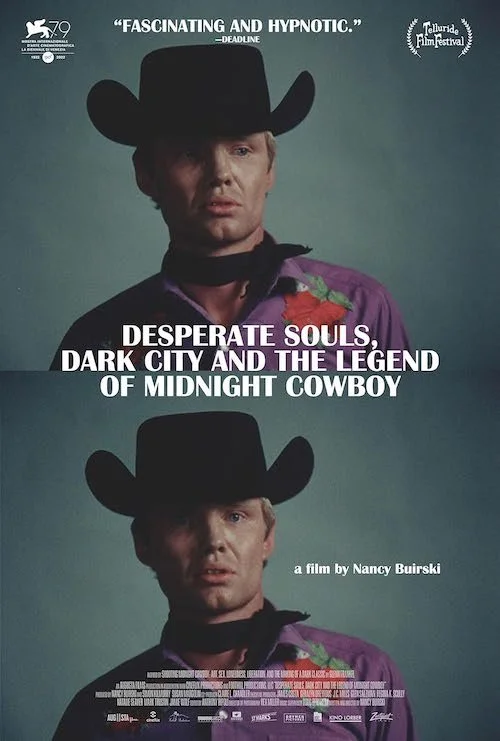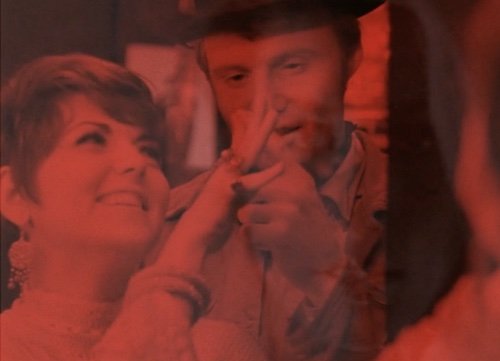Desperate Souls, Dark City and the Legend of Midnight Cowboy
Written by Andreas Babiolakis
Before I begin, I want to acknowledge the unfortunate passing of director/producer Nancy Buirski, who died on August 29th, 2023. Desperate Souls, Dark City and the Legend of Midnight Cowboy, her last documentary or feature film released (a short film named Endangered will be released posthumously), has received a bit of a second wind of recognition since her sudden death, perhaps as an acknowledgement of her achievements as a producer extraordinaire (there’s also the obvious fact that people still love the only X-rated Best Picture winner in Oscars’ history, Midnight Cowboy, including yours truly). Having said all of this, I wish — nearly prayed — that I liked Desperate Souls, Dark City and the Legend of Midnight Cowboy more than I did. It feels like an honest attempt at capturing the zeitgeist surrounding this counterculture classic without the proper means to tell the story; if you want to know what a documentary that is missing its necessary footage feels like, this is an example.
Desperate Souls aims to depict the importance of John Schlesinger’s film given the state of America at the time (post-John F. Kennedy’s assassination, the nation’s hostility towards the LGBTQ+ community at the time, and more important factors). We get into the creation of the film a little bit but the gestation process is depicted quite emptily. Jon Voight is present to discuss his time during the production phase and the film’s aftermath, and Desperate Souls does boast quite a few big names (Bob Balaban, Jennifer Salt, Brian De Palma, et cetera), but we don’t get enough people for each talking point to fully round out what the documentary is trying to achieve. Within the context of this film, I actually don’t mind Voight’s company as he riddles off the memories he has, but it always feels like we get only two to three perspectives on each topic, and it’s the kind of information you can get in a Bordwell and Thompson textbook (or via the internet); basically, the majority of this subject has already been covered quite thoroughly, given the fascination many have for it. Newbies to the topic may find themselves wondering about the finer details that we never really get.
Desperate Souls, Dark City and the Legend of Midnight Cowboy is well-intentioned but rather slim in the depth it possesses regarding its discussions of counterculture cinema and Midnight Cowboy.
The film almost feels like an incentive to watch Midnight Cowboy, not an add-on that confirms why the film you just watched is a masterpiece to watch afterward. It makes more sense to watch it before watching Midnight Cowboy for the first time, but it also doesn’t make sense to ever do that, either (I guarantee most if not all, cinephiles would just go straight to the classic film instead). As the documentary progresses, its bullet point topics feel like they are pulled out of thin air and compiled in this film because they have to be there. It’s not to say that any of the subjects feel out of place thematically, but rather that Desperate Souls doesn’t know how to go about linearly assembling these points. Desperate Souls feels like a run-on sentence by a person who really loves Midnight Cowboy and cannot stop talking to you about its importance; you’ll be able to pick out a couple of important points, but the rest runs together like a blur of factoids.
What helps this documentary is the clear passion that is present. Whoever is on screen wants to be there (even De Palma who tunes in via Zoom, it seems). The documentary is clearly a love letter not just to Midnight Cowboy but the many films like it (Easy Rider, The Wild Bunch, et cetera). It does at least attempt to create a bigger picture regarding the mindset of the world at the time and how desensitized we have become regarding taboo art and shocking entertainment. I respect all of this, and I think there is an audience for this film somewhere. I just don’t quite know who it is. Fans of Midnight Cowboy may not learn anything new here. Those who have never seen the film may get the exact same amount of important information via a condensed, five-minute Ben Mankiewicz introduction on Turner Classic Movies. At least Desperate Souls has a collective affinity for counterculture cinema and the shift to the New Hollywood Wave via the people who lived through these times (or were inspired by them). I don’t think the documentary will offend or upset anyone who watches it, so it really doesn’t hurt to give it a bash. I just wish there was more to take away from this documentary based on one of my favourite films of the sixties, especially since Desperate Souls was made with love, knowledge, and respect. If there was something more profound here, I missed it. It’s like the documentary is talking at me, and I don’t hear a word it’s saying.
Andreas Babiolakis has a Masters degree in Film and Photography Preservation and Collections Management from Ryerson University, as well as a Bachelors degree in Cinema Studies from York University. His favourite times of year are the Criterion Collection flash sales and the annual Toronto International Film Festival.






